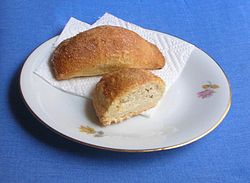Flaó (plural flaons, pronounced [fləˈons]) is a cheesecake or tart found in Spanish cuisine popular from Levante.[1] It is claimed by Majorca, Ibiza and Formentera, with some controversy.[2] Traditionally flaons were part of Easter family celebrations in Menorca, but now they are available all year round.[citation needed]
 Flaons de Morella with a filling of cottage cheese (brull) | |
| Type | Cheesecake/Pie |
|---|---|
| Region or state | Levante, Spain |
| Main ingredients | Cheese, sugar or honey, jam, dough |
In some regions flaons are a type of crescent-shaped pie filled with jam and honey in Calasseit, Tarragona, or some type of cheese, varying according to the location. Honey was used traditionally, but in modern times sweet flaons are usually sweetened with sugar. Historically, the first recorded mention of these cakes is from 1252 and they are mentioned as well in Ramon Llull's book Blanquerna, written in 1283.[3]
Variants
editAlt Maestrat
editIn the Alt Maestrat and Ports areas the cake has a semicircular shape and it is filled with a mixture of local cottage cheese (brull) and ground almonds flavored with aguardiente and mistela.[4] The flaons of Morella are the gastronomic icon of the ancient city. An average-sized Morella flaó is about 12 cm long.
Ibiza and Formentera
editThe flaó d'Eivissa has a circular shape and has a filling of sheep or goat cottage cheese, eggs and sugar, slightly aromatized with peppermint leaves and aniseed.[5] Flaons are usually eaten along with a glass of sweet wine or the local Liqueur frígola, a thyme-based digestive beverage.[6]
Menorca
editThe flaó de Menorca is a pastry made with tender Maó cheese, wheat flour, olive oil and yeast. Often they include egg and a little lard in the recipe. Good Menorca flaons have to be very puffy in the middle. There are salty and sweet versions of this pastry in Menorca. Some of them have a filling, while in others all the ingredients are mixed together.[7]
Matarranya
editThe flaonets de Calaceit (Catalan: flaonets = little flaons) are made in Calaceit, a town of La Franja region of Aragon. They are a different kind of pastry despite their name, for instead of cheese these small pastries have a filling based on pumpkin jam and honey.[8] These flaonets were one of the traditional Spanish pastries fondly remembered by painter Salvador Dalí.[9]
Gallery
edit-
Flaó d'Eivissa made in Ibiza
-
Flaó de Menorca from Menorca
See also
editReferences
edit- ^ Goldstein, Darra. Oxford Companion to Sugar and Sweets. Oxford University Press.
- ^ Sevilla, María José (2019). Delicioso: History of Food in Spain. Reaktion Books. p. 293. ISBN 978-1-78914-189-4.
- ^ Betí, Lluís Gimeno (1998). De lexicografía valenciana (in Catalan). Publicacions de l'Abadia de Montserrat. p. 175. ISBN 978-84-8415-034-3.
- ^ Flaons de Morella (in Spanish)[dead link]
- ^ Ibiza Food
- ^ "Flaó and Greixonera". Archived from the original on 2011-09-19. Retrieved 2010-11-04.
- ^ Rebosteria Típica - Ajuntament de Maó
- ^ Lluís Gimeno Betí, De lexicografía valenciana, in De las ciencias auxiliares de la Historia a la cultura escrita ed. by Francisco M. Gimeno Blay, 1999, Publicacions de la Universitat de València, ISBN 978-84-370-3931-2
- ^ Jaume Fàbrega, Dalícies: a taula amb Salvador Dalí, Cossetània Edicions ISBN 84-9791-001-X